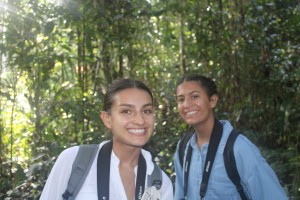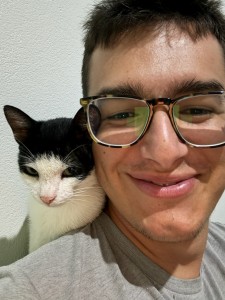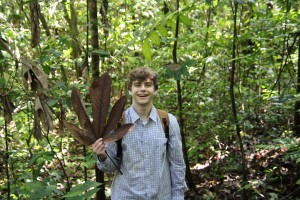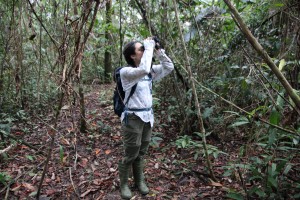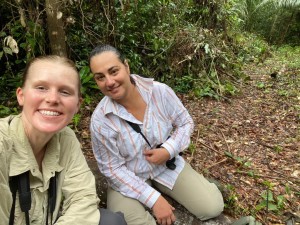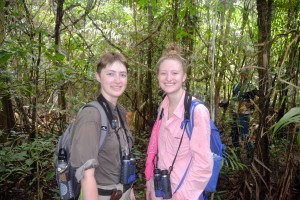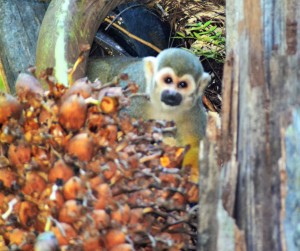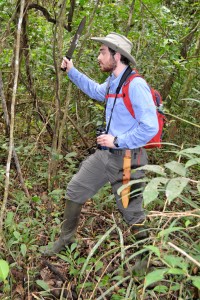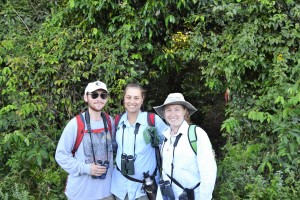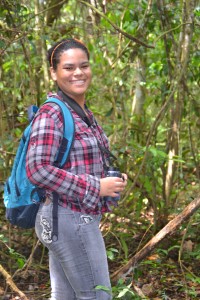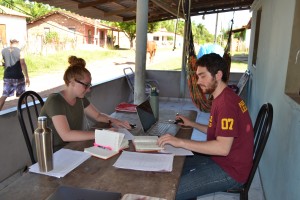People
I received my B.S. (Biology) from Oberlin College, and my Ph.D. from the Program in Ecology, Evolution and Conservation at the University of Illinois at Urbana-Champaign. I began working at the field site of Ananim, with squirrel monkeys, in 2000 with my graduate work and was instantly hooked. Since then, I have continued fieldwork with that population of squirrel monkeys and the more I discover about them, the more questions I have– that’s how science works!
I am now an Associate Professor at California Lutheran University, in the Biology Department. In addition to fieldwork with primates, my second passion is teaching, both in a classroom/lab setting and one-on-one research mentoring. At Cal Lutheran, I teach a variety of courses that you can learn about by visiting my faculty page. You can also learn more about my background by checking out my CV.
Current and past lab members
2025 Cohort: Casey Edwards, Bella Fuentes and Kamryn Mortensen
Casey’s research focuses on the question: are fatter males “sexier”? She will be examining female choice (a type of sexual selection) in two groups of wild squirrel monkeys, over the 2025 mating season. Data will be collected on male-female sociosexual interactions, to examine whether males who experience a higher degree of fattening are preferred by females and have a higher mating success, compared to males who fatten less. At the same time, Bella and Kamryn’s work focuses on the question: are fatter males “tougher”? They will be examining male-male competition (a type of sexual selection) in wild squirrel monkeys. Data will be collected during summer 2025 on male-male aggressive interactions, to examine whether males who experience a higher degree of fattening initiate and win more male-male contests and experience higher mating success, compared to males who fatten less. All three students are funded by the National Science Foundation.
2024 Cohort: Bella Fuentes, Vanessa Lopez and Landon Stouch
Landon’s research also focuses on the question: are fatter males “sexier”? He collected data on female choice in wild squirrel monkeys during the 2024 mating season and is currently compiling results and writing his senior thesis. Meanwhile, Bella and Vanessa’s project focuses on the question: are fatter males “tougher”? They examined male-male competition during summer 2024 and are currently compiling their results for a poster presentation. All three students are funded by the National Science Foundation.
2023 Cohort: Jacob Carrell, Jilly Kinsley and Natalie Miller
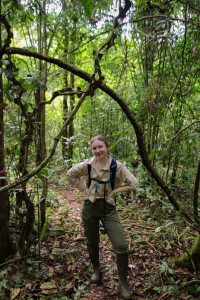 Natalie pioneered the research on whether fatter males are “sexier”, by collecting data on female choice in wild squirrel monkeys during the 2023 mating season. In parallel, Jacob and Jilly pioneered investigations on whether fatter males are “tougher”, by examining male-male competition during summer 2023. Both teams presented their results at the West Coast Biological Sciences Undergraduate Research Conference. All three students were funded by the National Science Foundation.
Natalie pioneered the research on whether fatter males are “sexier”, by collecting data on female choice in wild squirrel monkeys during the 2023 mating season. In parallel, Jacob and Jilly pioneered investigations on whether fatter males are “tougher”, by examining male-male competition during summer 2023. Both teams presented their results at the West Coast Biological Sciences Undergraduate Research Conference. All three students were funded by the National Science Foundation.
PAST LAB MEMBERS
Amy Wilkerson
Because of the COVID-19 pandemic, travel to our field site in Brazil was put on hold for a while. Therefore, in summer 2021, Amy stayed on campus and used a multi-year behavioral data that we already had collected to examine behavioral sexual dimorphism in adults and juveniles. Specifically, she examined differences in activity budgets and social association patterns of adults, young juveniles and older juveniles. Questions she explored are: 1) What, if any, is the pattern of behavioral sexual dimorphism of adult squirrel monkeys during the mating season? 2) At what age do juveniles show behavioral sexual dimorphism? 3) Do the juvenile sex differences mirror the adult sex differences? Amy received a Swenson Science Summer Research Fellowship to conduct her project. Happy note: In summer 2022, Amy was finally able to travel to Brazil and assist Dr. Stone with her field research.
Seta Ag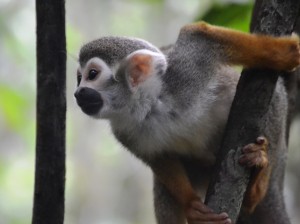 hababian
hababian
Squirrel monkey juveniles play extensively but not much systematic data on this behavior are available from wild populations. Seta spent Summer 2019 in Brazil, examining the age and sex of juveniles at play. She examined the relationship between male-male competition during the mating season and patterns of juvenile play, particularly rough-and-tumble play. Since squirrel monkeys are polygamous and males compete for access to females, we expected that older juvenile males would exhibit higher rates of play behavior. Seta was a recipient of a Swenson Science Summer Research Fellowship.
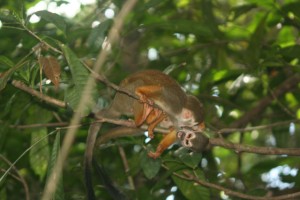
Claire Meuter
Unlike what we see in many primates, in squirrel monkey (Saimiri collinsi) groups adult males are not socially dominant over adult females. However, it is not clear whether males and females are co-dominant or if females are socially dominant over the males. Claire collected systematic behavioral data in Summer 2019 and found that adult females are indeed dominant to adult males. In her presentation, “Females Rule, Males Drool”, Claire tells us all about what the social interactions look like between the sexes in squirrel monkeys at our field site. Claire was a recipient of a Swenson Science Summer Research Fellowship.
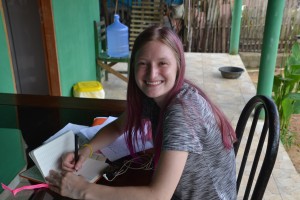
Nathan Delacth
Nathan’s 2018 summer research focused on an intriguing behavior called “urine washing”, in which an individual urinates on its palms and then rubs the urine on its soles. Squirrel monkeys and other neotropical primates do this constantly, and yet the function of this behavior and the contexts in which it occurs is still unknown. To test functional hypotheses on urine 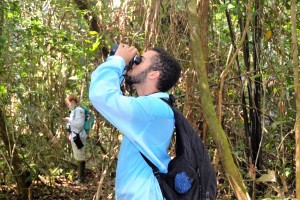 washing, Nathan spent 8 weeks in Brazil collecting behavioral and environmental data on two groups of squirrel monkeys, following up on the work of former student Jacob Jasper. Nathan was a recipient of a Swenson Science Summer Research Fellowship.
washing, Nathan spent 8 weeks in Brazil collecting behavioral and environmental data on two groups of squirrel monkeys, following up on the work of former student Jacob Jasper. Nathan was a recipient of a Swenson Science Summer Research Fellowship.
Stephanie Straw
Stephanie’s research focused on a unique male-infant interaction pattern that we see in our groups of squirrel monkeys, or what we call “inverse agonism”. Adult males receive aggression from the female’s youngest offspring when they try to approach the female during mating season. Stephanie completed two field sea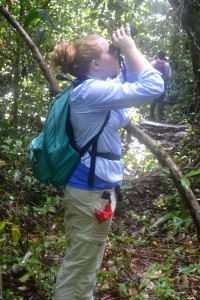 sons of data collection in Brazil (Summer 2017 and Summer 2018), investigating the contexts in which inverse agonism occurs, as well as the sex of the infants initiating the aggression. Stephanie was a recipient of a Swenson Science Summer Research Fellowship.
sons of data collection in Brazil (Summer 2017 and Summer 2018), investigating the contexts in which inverse agonism occurs, as well as the sex of the infants initiating the aggression. Stephanie was a recipient of a Swenson Science Summer Research Fellowship.
Jacob Jasper
Jake was the pioneer in our lab in the investigations of “urine washing”, a behavior in which an individual urinates on its palms and then rubs the urine on its soles. To test functional hypotheses on urine washing, Jake spent 8 weeks in Brazil in Summer 2017 collecting behavioral and environmental data on three groups of squirrel monkeys. Jake was a recipient of the Jung Summer Research Fellowship.
Luana Ruivo
Luana was a Masters student in the Graduate Program of Veterinary Sciences at UFRA. She completed her degree in 2015, and her work focused on the relationship between reproductive seasonality and feeding patterns of female squirrel monkeys. Her work has been published in the American Journal of Primatology.
INTERESTED IN DOING RESEARCH IN THE LAB?
Motivated and hard-working students should contact Dr. Stone to pursue independent research projects. Research in our lab requires a 3 semester commitment, from planning your study to collecting and analyzing data to presenting your results to the scientific community. Also note that working in a tropical rainforest with monkeys is not like what you see on Animal Planet: you must be able to deal with heat, humidity, mosquitoes, hiking and almost no internet for several weeks!
Summer Research Grants at Cal Lutheran
The Office of Undergraduate Research and Creative Scholarship offers a number of summer grants specifically for student research.
